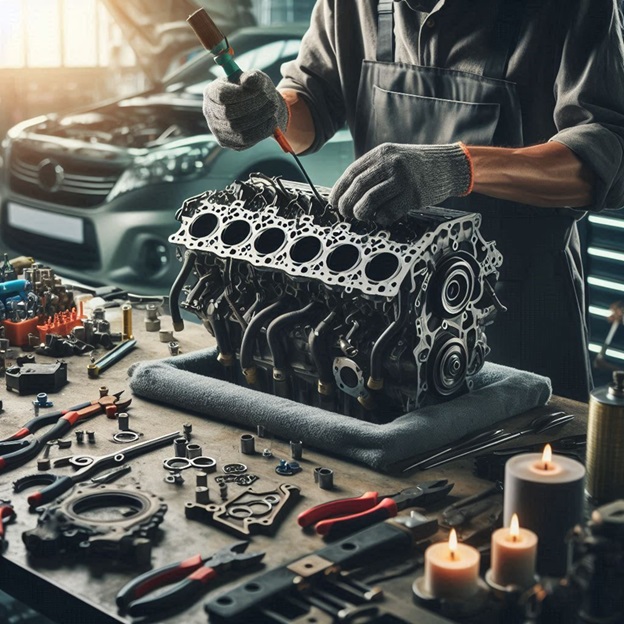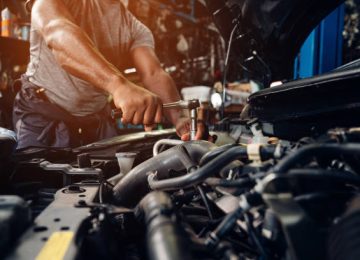When your car’s engine is experiencing issues related to overheating, coolant loss, or white smoke from the exhaust, the head gasket is often the culprit. The head gasket is a crucial component that sits between the engine block and the cylinder head, sealing the combustion chambers. A failure in this part of the engine can lead to a number of problems, including engine misfires, oil and coolant mixing, and significant engine damage. So, when your car shows signs of head gasket failure, you’ll need to decide between two potential solutions: head gasket repair or replacement. In this article, we’ll explore both options in detail, weighing their pros and cons to help you determine the best course of action for your vehicle. Additionally, we’ll explore head gasket repair in Newark, DE, and why this may be a viable solution for some drivers.
What Does a Head Gasket Do?
Before diving into the repair vs. replacement debate, it’s essential to understand the role of the head gasket. The head gasket serves as a seal between the engine block and the cylinder head, ensuring that the engine’s combustion process runs smoothly. It prevents coolant and oil from mixing, as well as keeping the combustion gases inside the cylinders where they belong. Essentially, the head gasket helps maintain the engine’s overall performance by ensuring that various fluids and gases remain contained in their designated areas.
When a head gasket fails, the results can be catastrophic for your engine. Common signs of a blown head gasket include:
- Overheating: One of the most common symptoms of a head gasket issue is engine overheating, as coolant may leak into the combustion chamber or out of the engine entirely.
- Coolant loss: If the coolant is mixing with the engine oil or leaking into the exhaust system, you may notice a significant drop in coolant levels.
- White smoke: If coolant is burning in the combustion chamber, it can cause thick white smoke to come out of the exhaust pipe.
- Milky oil: A mixing of oil and coolant can create a milky, frothy substance that can be seen on the oil cap or dipstick.
- Poor engine performance: A blown head gasket can lead to misfires, rough idling, and a decrease in overall engine power.
When these symptoms appear, the head gasket may need to be repaired or replaced, depending on the severity of the damage.
Head Gasket Repair: Is It a Viable Option?
Head gasket repair is a popular solution for many vehicle owners who want to avoid the high cost of a complete replacement. In some cases, head gasket repair can be a quick and effective way to fix a blown head gasket, especially if the damage is minor or localized. The process involves sealing the leaks or cracks in the head gasket using specialized sealants or materials.
Pros of Head Gasket Repair:
- Cost-effective: Repairing a head gasket is generally cheaper than replacing it. For those on a tight budget or who want to keep their car running without breaking the bank, this can be an appealing option.
- Quick turnaround: Head gasket repair is often faster than a full replacement. In many cases, it can be completed in a few hours or a day, depending on the extent of the damage and the skill of the mechanic.
- Temporary solution: In some cases, a repair can last for a long time and provide enough functionality to allow the car to run smoothly for several more years.
Cons of Head Gasket Repair:
- Not a permanent fix: While repair can be effective for small leaks or cracks, it’s not a permanent solution. Over time, the sealant or repair material may degrade, causing the problem to recur. This can lead to additional repairs down the road.
- Not suitable for severe damage: If the head gasket is severely damaged, such as having large cracks or warping, a repair may not be sufficient. In these cases, the head gasket will need to be replaced entirely.
- Potential for further engine damage: If the repair doesn’t address the underlying cause of the failure, such as overheating, the problem could return and cause further damage to the engine.
Head Gasket Replacement: A More Permanent Solution
If the damage to your head gasket is extensive or the repair option isn’t holding up, replacement may be your best bet. A complete head gasket replacement involves removing the cylinder head, replacing the old gasket with a new one, and reassembling the engine. While this process is more involved and time-consuming than a repair, it offers a long-term, permanent fix to the problem.
Pros of Head Gasket Replacement:
- Long-term solution: Replacing the head gasket entirely ensures that your vehicle will run efficiently for many more miles. It addresses the root cause of the problem and eliminates the risk of leaks or coolant contamination.
- Prevents further engine damage: When done properly, replacing the head gasket ensures that your engine is sealed properly, preventing coolant and oil from mixing. This protects other engine components from further damage.
- Better resale value: If you plan to sell your car in the future, a complete head gasket replacement can increase its resale value. Buyers are more likely to be attracted to a car with a new, reliable engine than one that has experienced head gasket issues.
Cons of Head Gasket Replacement:
- High cost: Head gasket replacement is significantly more expensive than a repair. The labor involved in removing and reassembling the engine can be time-consuming, and the cost of the parts themselves can be pricey.
- Longer downtime: Replacing a head gasket can take several days or even a week, depending on the complexity of the engine. If you rely on your car daily, this extended downtime can be a major inconvenience.
- Requires specialized skills: Replacing a head gasket is not a task for amateur mechanics. It requires a high level of skill and knowledge of the engine, so it’s important to find a trusted professional to handle the job.
Head Gasket Repair in Newark, DE: Why You Should Consider Local Options
When deciding between head gasket repair or replacement, it’s crucial to factor in the availability and expertise of local mechanics. In Newark, DE, there are several reputable repair shops that specialize in head gasket services. Choosing a local shop can have several advantages:
- Convenience: Locating a repair shop near you means less time spent traveling to and from the mechanic. Additionally, you may be able to get quicker service due to proximity.
- Expertise: Local shops are familiar with the specific needs and challenges of vehicles driven in the Newark area. They may have dealt with similar head gasket issues in the past and have a better understanding of local driving conditions.
- Community reputation: By choosing a reputable local shop in Newark, DE, you can rely on word-of-mouth recommendations and reviews from others who have had similar issues. This helps you find a trustworthy mechanic who can offer honest advice on whether repair or replacement is the best choice for your car.
If you’re facing head gasket issues in Newark, DE, it’s important to consult with a local mechanic who can evaluate the extent of the damage and recommend the most cost-effective solution. Whether you opt for head gasket repair or replacement, having an experienced professional in your corner will give you peace of mind knowing that your car is in good hands.
Conclusion
In the debate between head gasket repair and replacement, there is no one-size-fits-all answer. The best solution depends on the severity of the damage, the age of your car, and your budget. If the damage is minor and your car is relatively new, a head gasket repair might be a good option for you. However, if the damage is significant or your car has a lot of miles on it, a full replacement may be a better, longer-lasting solution.
For drivers in Newark, DE, it’s important to seek professional help from a trusted local mechanic who specializes in head gasket repair and replacement. By working with an experienced professional, you can ensure that your engine runs smoothly for years to come, no matter which solution you choose.












